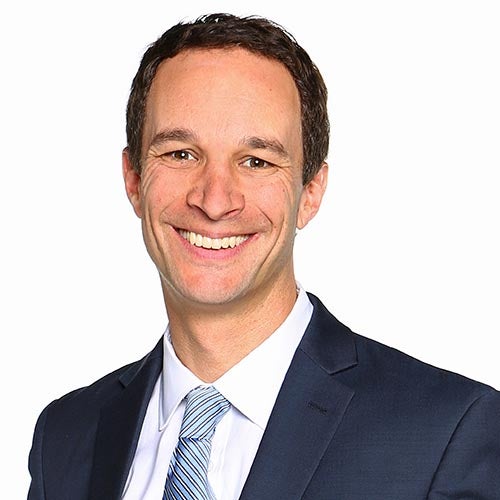Podcast: Our investment market outlook for 2024

Investors have a lot on their minds early in 2024. When will central banks start cutting rates? What could that mean for portfolios? Will the upcoming election change the playing field? Kristina Hooper, Chief Global Market Strategist, and Alessio de Longis, Head of Investments for Invesco Investment Solutions, joined the Greater Possibilities podcast to discuss their market outlook for 2024. Let’s hear what they had to say.
What can investors expect in 2024?
Kristina Hooper: It's about the lagged effects of monetary policy at the end of the day. There's much more to be seen in terms of the impact that rate hikes have had, both good and bad. So we're likely, very likely, to continue to see significant disinflation, but it comes at a cost. So as we look ahead to 2024, we think of this as a balancing act, right? Will inflation get under control faster than the economy deteriorates? And that is the very significant balancing act. So hopefully, in a few months, consumers will feel better, because we'll have made more progress on disinflation, but we won't have had a very significant impact in terms of depressing economic growth.
Listen to hear more from Kristina:
Transcript
What I would say is that this is an environment that is changing as we speak. Markets are processing the reality that the Fed has almost certainly stopped hiking rates. And that means there is a change in markets because they start to discount an economic recovery, so we're already starting to see that.
Of course, in the early stages, there will be a lot of volatility because there is still some level of policy uncertainty. The Fed has not come out and said they've ended rate hikes, and in fact, we might get some hawkish language from the Fed trying to tamp down financial conditions. But in my opinion, this is the beginning of a recovery trade. And I think that's important for investors to understand. I'm very excited about the coming months for markets and investors.
Alessio de Longis: We are in a cycle that is already somewhat extended and accelerated because of the policy response to COVID. For investors, this is not a (time to) close your eyes and forget your investment strategy. Investors need to reassess and evaluate how monetary policy is impacting the economy. We have a long way to go on that. And given the geopolitical risks that are real and alive, investors need to maintain basically a fluid approach to analyzing the situation. And if the facts change, be prepared to change their investment posture.
Listen to hear more from Alessio:
Transcript
I think from an investment standpoint, this is an environment where we believe investors are still compensated for adding cyclical risk in the portfolios, maintaining overweight exposures to things like credit or equities. This is an environment where compensation for risk-taking should still play out.
What about that much-anticipated US recession that was expected in 2023?
Alessio de Longis: Well, I think what happened is exactly the super important element that Kristina just highlighted, the balancing act between inflation and unemployment, right? Unemployment is at all-time lows. You don't have a recession. Obviously, unemployment is a lagging indicator, but even the leading indicator of unemployment are suggesting, if anything, a moderate rise in unemployment that would be perfectly consistent with that Goldilocks scenario that Kristina has outlined — where inflation comes down faster than the unemployment rate rises, growth remains good enough, not too hot, which is exactly the perfect development for monetary policy.
Listen to Kristina's view:
Transcript
There is that significant alternate scenario, significant probability of an alternate scenario, in which we get more of a hard landing because rates are higher for longer, because of persistently high inflation. The other sub-scenario within a hard landing is that so much damage has been done to the economy, that it is sent into recession by the restrictive level of rates as they are now, which I think is a lower probability than that first scenario about a higher for longer. But again, I think our base cases are aligned in that it's certainly not the highest probability scenario. The highest probability scenario is that that D-train, that disinflation train, continues and it's significant.
Could the Federal Reserve lower interest rates in 2024?
Kristina Hooper: We anticipate that rate cuts would begin by the end of the first half of '24. Now, this will be dictated very much by the data we see going forward, but from where we sit today, we think that's very likely.
All we have to do is look at the December 2021 dot plot and the expectations for the Fed funds rate at the end of 2022 to know that. And so, clearly, markets have been going through this repricing process. I think, in particular, what we've seen is that recently with the CPI (Consumer Price Index) print for October, there is this great realization that, in fact, the July rate hike was the last one.
Listen to hear more from Kristina:
Transcript
And that if we use that rule of thumb that it's about eight, eight and a half months to the first rate cut, that'll take us to the second quarter of '24, and that we'll probably see around a hundred basis points in cuts. But again, we just don't know about the lagged effects of monetary policy. Maybe it's even more than that in '24.
Listen to hear more from Alessio:
Transcript
There is a non-negligible probability of a scenario where the inflation picture changes on a dime. And this, I'm fairly convinced of, central banks around the world have been so shocked by how wrong they were on inflation that they will be very reluctant to deliver any rate cuts when the optics of inflation are not supporting that decision. So not my base case, but I would say that's more than a 20%-30% probability, which is not negligible.
If rates are cut, what could it mean for investors?
Kristina Hooper: Those rates will come down and investors will move their money. What we have seen is very mobile money over the last few years. They might as well have sneakers on them because they've moved. They've moved out of traditional bank accounts into high yielding accounts, and they are poised to move, in my opinion, in a significant way.
Listen to hear more from Kristina:
Transcript
And they're likely to follow the path of historical recovery traits. So that ultimately means a broadening of the market because it won't just be the defensive, the large caps, the traditional areas where investors have focused recently, it's going to be about the small caps, it's going to be about the international, especially emerging markets.
How could the 2024 US election affect markets?
Kristina Hooper: I don't think elections matter. Certainly, not in a material way over more than the very short term. Certainly, we can see short-term gyrations as a result, but I don't think it really matters in the medium or longer term. Now, geopolitical issues, they can have a bigger impact, although again, very much in the shorter term, in my opinion. We always have to ask ourselves, is it contained or is it contagious?
Listen to hear more from Kristina:
Transcript
We always have to ask ourselves, is it contained or is it contagious? And I think that's a question you ask about any kind of crisis, whether it's a financial crisis or a geopolitical crisis. But I tend to not let myself get concerned about geopolitical crises because we know the history, and what the history has told us is that it doesn't matter to markets in any material way over the longer term.
Alessio de Longis: I agree with Kristina. We mentioned earlier, oil prices as being a real time barometer to determine when a regional problem becomes a global systemic problem. Oil prices is a very simple way to think about that transmission mechanism that affects everyone. But Kristina said something important earlier on monetary policy and recessions, which applies also here with geopolitics.
Listen to hear more from Alessio:
Transcript
You don't position a portfolio ahead of geopolitical risk, which is kind of like a lottery ticket in terms of probabilities, in terms of how rare and difficult to understand they are. But once a geopolitical risk hits, there is also often the right or wrong policy response. So again, we're back to that template that Kristina described. Watch for that policy response. Watch for what policymakers will do to exacerbate or remedy to the problem. And yes, agreed, elections. We need to make a distinction. Politics don't drive markets. Economic policies drive markets.
Alessio de Longis: So once an election outcome is clear, going back to the drawing board and understanding what are the economic policies that come with that election outcome, now you can go back to a sound investment process and determine what the impact on the market is. So, you don't position ahead of an election. But as investors, we need to understand once the election outcome is certain, what are the economic policy implications, if any, and have they changed?
Listen to hear more from Alessio:
Transcript
And historically, what we find is that economic policies tend to impact more the relative performance between sectors because taxation and fiscal policies are often redistribution policies, say between industrials and materials or financials and energy. But economic policies rarely go and affect the predetermined direction of bond markets, equity markets, and around the growth cycle, as you, Brian, have always described with analyzing the historical analogies between different administrations.
For more insights, read the 2024 Investment Outlook and listen to the full podcast below:


